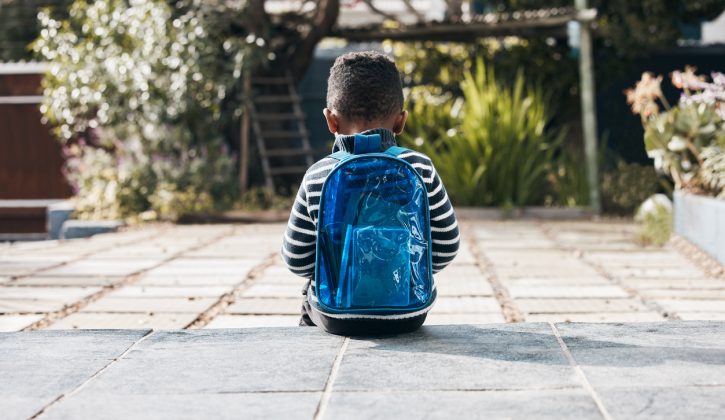The start of a new school year is a real mixed bag of emotions in my house. My youngest starts levitating with excitement two weeks out, and my oldest doubles down on her campaign to be homeschooled.
To be fair, school isn’t most kids’ happy place but there’s a difference between being grumpy about it and outright hating it.
So what’s a parent to do? How do we unravel the knot that parks itself in our stomach in mid-August and stays there all year? How do we help our kids through it? What do you do if your kid hates school?
What to Do if Your Kid Hates School…
Let’s start by acknowledging that the world has changed, and the school experience isn’t what it used to be. Mental health problems and anxiety are at an all-time high among adolescents, and Covid-induced social and educational delays are making everything harder.
Today’s students must navigate achievement expectations that are higher than ever and, in most cases, a one-size-fits-all approach to curriculum and instruction. Art, Music, and Phys Ed are the only classes where many students can breathe, socialize, and express themselves, but they’re also the first to go when budgets are cut.
And then there’s the human element. Many of our teachers are understandably exhausted, frustrated, and burned out, to say nothing of the fact that – thanks to social media – bullies and mean girls can now follow our kids home and into their bedrooms.
In short, we’re tired. Everyone’s tired. (Also, my back hurts.)
So maybe if your kid hates school, coaching them through this phase starts with admitting that school might not be a very fun place. And instead of insisting to your kid that going to school is better than working and paying bills (ahem, guilty), try putting yourself in their shoes.
But empathy is only part of it. What our kids really need us to do is act: to ask questions and aggressively advocate for them. We need to get involved in the school community and figure out what isn’t working and share that information with our children’s teachers and administrators to create the best possible experience for our kids.
That doesn’t mean taking him out of math class if he hates math. It means giving our kids the opportunity to tell us what’s working and what isn’t. It means understanding that the student’s voice is missing from most education settings, and what the consequences of this are.
“No wonder kids are bored,” one principal admitted, “because right now, there’s no room for their input. They’re not being heard. Kids don’t want to go to school because they feel like they don’t belong.”
Neurologist and classroom teacher Judy Wills argues that negative feelings toward school can actually indicate a healthy brain. But unfortunately, kids learn pretty quickly not to bother asking for help if they don’t always get it. Wills writes:
When children’s brains develop school negativity, it is usually the result of the effort-preserving mindsets constructed by unsuccessful prior efforts. Through a past history of failed efforts — past efforts to sustain attention in class, do homework carefully, persevere at challenging classwork — that did not result in success, children’s brains learn to automatically resist putting mental effort into subsequent similar activities.
It would be wonderful if teachers could tailor instruction to our children’s unique needs and preferences, but this is not a realistic proposition in most classrooms. Because no matter how hard a teacher works to cater to 20 or 30 unique little minds, and no matter how hard a school works to be safe, inclusive, and welcoming, some kids will fall through the cracks.
And that’s where parents come in. When something’s not right we need to ask questions (the type that will get you more than a “fine” in return) and share that information. Helping kids through “I hate school” starts with good communication between parent and kid and parent and school. Don’t leave it up to the overworked, under-resourced teacher to get to know your child as an individual. Provide her with the information she needs to do so and when problems arise, ask her “did you know this?” Yes, teachers have a lot on their plates but I’ve yet to meet one who wants less information about her students, not more.
Sometimes difficulties in the classroom stem from a learning or physical disability. Sometimes it’s as simple as making sure your child can see the board and hear the teacher properly, and sometimes there’s more going on. According to mayoclinic.org, students who aren’t at or approaching grade level in spelling, reading, writing, and math, or who have difficulty remembering or following instructions, should be tested for a learning disability.
Today’s teachers and schools are expected to be and do many things – so much so that ‘education’ often takes a back seat to social work and mental health. The responsibility is staggering, and the school community needs parents’ help. If your child has a medical issue, you talk to her doctor. If your child has an issue with his team, you talk to the coach. School is no different.
So if you’re dreading the new school year remember that YOU are your child’s best resource when it comes to solving problems. We shouldn’t remove every roadblock our kids experience, but we should be there to demonstrate problem-solving skills and help them when they need it.
Tagged under: what to do when your kid hates school,how to help when kids hate school,why does my kid hate school,how can I help my kid like school,how to talk to your kid's teacher,kid hates school
Category: parenting


